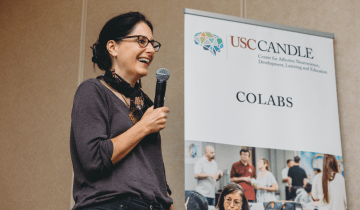District-wide one-to-one technology rollouts pose financial, technical and often political challenges.
Graduate student Ayesha Hashim has written her dissertation on the practical challenges faced by teachers in charge of leading a one-to-one technology rollout in a mid-sized urban district with the goal of exposing all students to the benefits of “technology-enabled” instruction.
At the outset of her research, Hashim suspected that these so-called ed-tech coaches would support instructional experimentation in schools, provide ongoing feedback to the central office leaders on instructional change and facilitate the gradual adoption of new best practices for instruction at scale.
Hashim focused specifically on the brokering practices of these ed-tech coaches, examining how these coaches connect central office administrators, curriculum coordinators, principals and teachers to one another to circulate relevant information on instruction and support district-wide improvements in teaching and learning. Ultimately, Hashim found that the ed-tech coaches’ brokering practices are shaped by their individual expertise and leadership skills, as well as organizational conditions that support and/or constrain distributed models of leadership (i.e., models of leadership that engage expertise where it exists throughout school systems rather than adhering to conventional, top-down leadership structures).
Last week, Hashim received the New Scholar Award for her dissertation in a ceremony at the annual conference of the Association of Education Finance and Policy in Washington, DC.
“Ayesha’s work is exemplary in that she is using novel techniques to probe critical policy implementation questions,” says Katharine Strunk, associate professor at Rossier and Hashim’s dissertation advisor. “Her dissertation examines how new technology-enabled professional development can be most effective in changing teachers’ practice. Districts spend quite a bit of money and teachers spend quite a bit of time attempting to utilize technology to improve practice and student outcomes. Ayesha’s dissertation will provide valuable insights both to the field and to policymakers and practitioners as we work to improve these systems and enhance teacher practice.”
Understanding knowledge-intensive reforms
In Hashim’s unspecified district, the adoption and distribution of devices went off without a hitch in comparison to other districts in the nation, but her focus would be on the methods employed by ed-tech coaches to ensure the district’s successful implementation of this technology rollout alongside the district’s adoption of the Common Core State Standards, a combination which she calls knowledge-intensive reform.
“These new reforms are forcing us to rethink what we expect teachers to be doing in the classrooms,” says Hashim. “District and school leaders no longer have a prescribed approach for how teachers should be teaching, what curriculum content they should be using or what digital devices and apps are most helpful for student learning. Instead, schools need to engage in a continuous process of experimentation—testing out new digital products and pedagogical approaches and then disseminating best practices at scale. It is a continuous cycle of searching, experimenting, adapting, sharing and then repeating.”
By tracking how ed-tech coaches broker information among central office and school actors on technology-enabled instruction and the CCSS, Hashim studies how these coaches build adaptive networks for instructional change, facilitating specific kinds of information exchange that lead to coordinated, coherent, aligned, and ultimately systemic improvements in teaching and learning. To inform her analysis, Hashim draws on social network theory and data collected from central office and school personnel in the 2014–15 school year. She also draws on qualitative data collected from a purposive sample of central office administrators, ed-tech coaches, school leaders and teachers in her district.
Implementation before impact
Hashim is grateful for the recognition from AEFP, especially from an organization that traditionally has been known primarily for its focus on quantitative studies.
“My dissertation is a mixed-methods study, and I draw on qualitative data to inform my social network findings,” she explains, clarifying that she’s not evaluating an impact of a policy, but rather she is telling an implementation story. “I think this award shows that the association is looking to promote different kinds of research on education policy and reform. It is a great honor.”
Hashim knows there’s more work to be done in her selected district, but she cautions against the temptation to solely focus on the long-term impacts of one-to-one computing initiatives.
“We just don’t yet have a clear understanding of how these reforms are being implemented to really know if they can have a positive impact on student achievement,” she says. “In addition to trying to assess the impact of these programs, we need to focus on how these reforms are being implemented and the instructional leadership that is guiding these implementation efforts. This will provide us with actionable insight on how to fix things that are going wrong in the implementation phase of these one-to-one initiatives so that we can then support better outcomes.”
Her dissertation adviser credits Hashim for her forward-thinking vision.
“Ayesha is that rare student who not only conceives of interesting and important questions,” says Strunk, “but has the capacity to pursue the answers in innovative and rigorous ways and also the skillset to translate her findings for multiple audiences, including policymakers and practitioners.”



